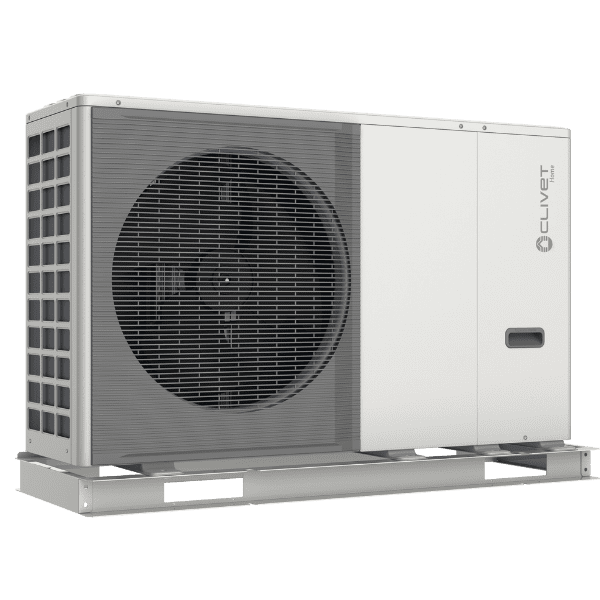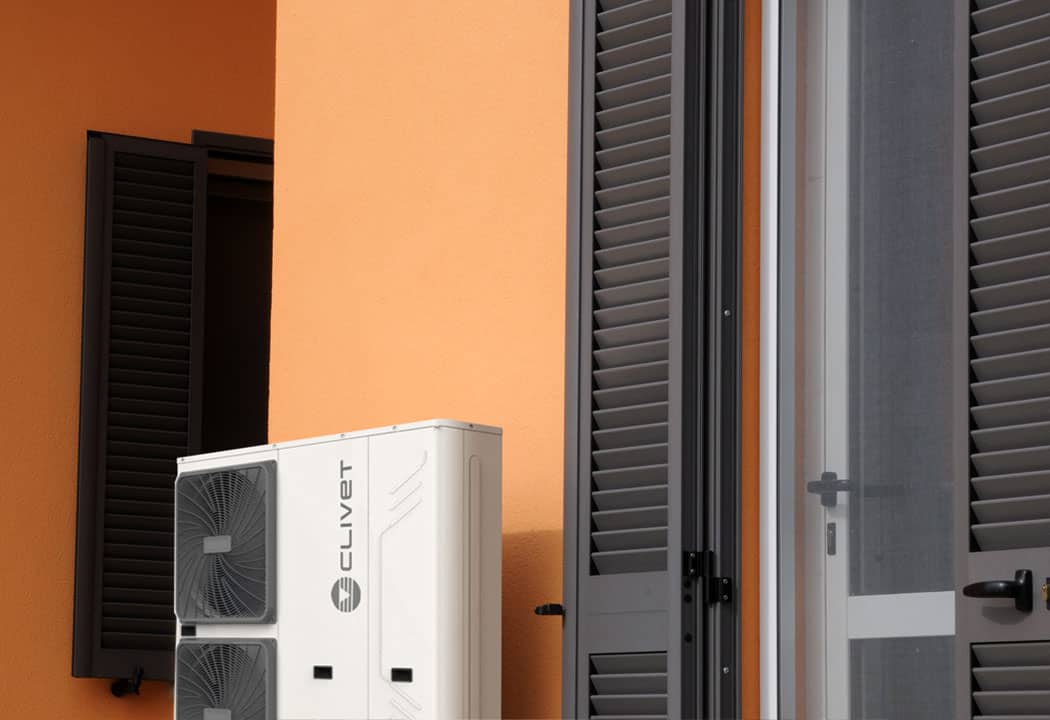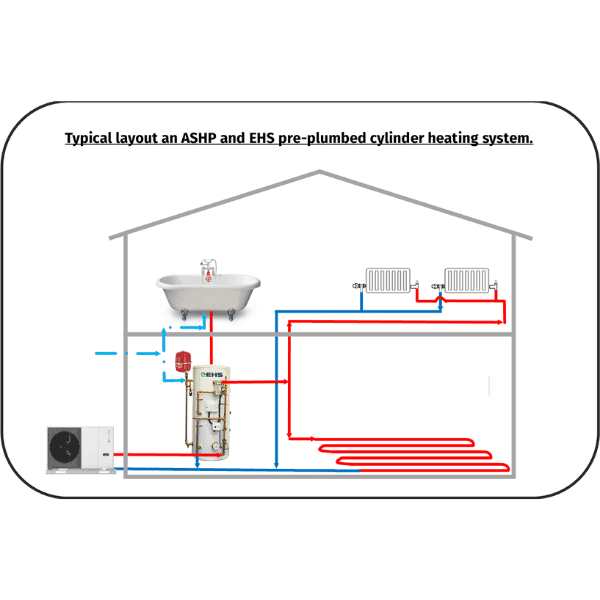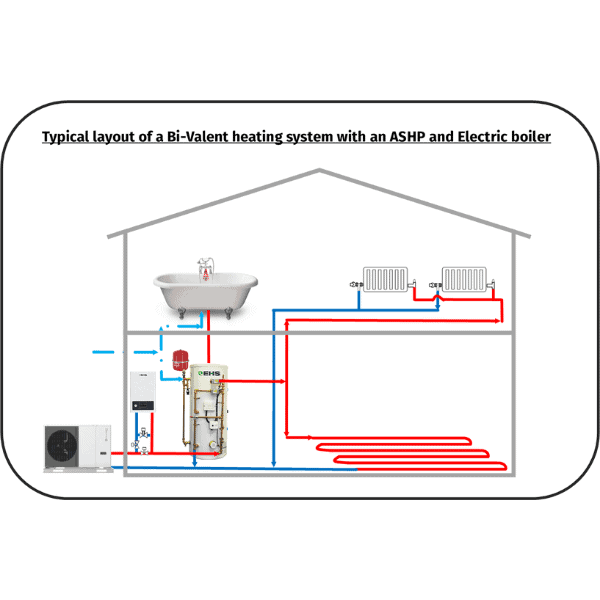- 0345 8628699
- info@ehs-heating.com
- Mon - Fri: 9:00 - 17:00

Air-source heat pumps can sometimes be referred to as air-to-water source heat pump, which transfers heat from the outside air to water, heating your rooms via radiators or underfloor heating. They are often used to heat water stored in a hot water cylinder.

Clivet’s latest range of domestic air source heat pumps, the Elfo-Energy Edge Evo models, go from the single fan 5kW Edge Evo 21 up to the 16kW twin fan Edge Evo 81.
Air Source Heat Pump Schematics


Lower operating costs: If the heat pump systems are sized and fitted correctly by an approved installer, your system will operate at a low cost and save money on your energy bills.
Low Co2 emissions: Currently, electrical energy is the greenest of all energy types available, with wind turbines growing to be the biggest Heat pumping offers many advantages. A heat pump with an air source saves you energy consumption by using less energy compared to a typical heat source. Air Source Heat pumps are versatile in terms of their cost. The ASHP can use a heating or cooling system for heating or water heating.
Installation cost: Depending on the size of the property and what is required the costs of the new system may be out of reach for 90% of the population at present. If retrofitting this system to an old house with old radiators and little insulation, the initial costs will be quite large. A modern house with good insulation and a heating system should be cost-effective with a short payback period.
Space required: the air source heat pump will need some outdoor space and some indoor space for a hot water cylinder.
Perceived Noise: At full load, an air source heat pump operates at about 56dba, which is about the same as a conversation at 3ft or light rain. At 3m away from the air source heat pump, the noise levels drop to 35dba or the same as a whisper. An air-source heat pump fan system works hardest when the air is coldest – i.e. in the winter when we are mostly indoors. During warm weather, heat pumps work less hard as they do not need as much air, and therefore the noise is much lower. Positioning the heat pump system is key.
Air source heat pumps are well-known technology with a lifetime between 20 to 25 years. Just like with boilers, you need to service your air source heat pump annually to ensure it continues to work at its maximum efficiency.
Spare parts are available to order from EHS on a next-day delivery service.
Air source heat pumps can provide all of your central heating and hot water requirements throughout the year, at a quarter of the normal energy use.
It is extremely important that, before you start work on any heating system, your home has been suitably insulated and the heating system designed and sized accordingly for you to get trouble free heating and hot water. Don’t forget that good insulation is the key, as the cheapest and greenest energy is always the energy we don’t use!!
Have a professional MCS approved installer provide you with all the heat loss calculations for your property so that any proposed heating system is properly designed to suit your home. If you are struggling to find one please contact us and we’ll put you in touch with some reputable MCS approved installers in your area.
An air source heat pump (ASHP) utilises the renewable ‘heat energy’ in the outside air, concentrates it, and transfers it to your central heating system to provide the heating and domestic hot water in your home (A ground source heat pumps system is very similar but uses heat stored in the ground) The heat pump only uses a small amount of electricity in order to do this, so for every 1kw of electricity that is used by the air source heat pump, between 3kw and 5kw of heat is extracted from the air outside and delivered into your property.
An air source heat pump has a heat output efficiency of between 300 to 500% i.e. you get 3 to 5 times more energy out than you put in. That’s what we call the ‘coefficient of performance’ or COP and you’ll see air source heat pumps rated this way.
Obviously, there is more heat in the outside air during hot weather than there is in cold weather, therefore the air source heat pump has to work harder to generate heat from the cool air to provide heating and hot water for the home. For instance, the air source heat pump might use 2kw of energy to achieve the 5kw of energy demand of the home when it was -4degrees C outside, which would give an efficiency of 250% rather than the 500% seen in the hotter months. To account for this, all air source heat pumps have a quoted ‘seasonal coefficient of performance’ figure or SCOP which is like the COP but just averaged out over the whole UK year to give an indication of its performance throughout a year. You will still see SCOP figures of around 3.6, which means for every 1 kw of energy input you will get an average of 3.6kw of heat energy output.
Typically a new condensing gas boiler or oil boiler has an efficiency of about 92% (if commissioned correctly) which means for every 1kw of gas input, only 0.92kw of energy is delivered into your home. Gas and oil are less efficient and will also produce greater than 5 times more carbon emissions.
As air source heat pumps offer low carbon heating, can use 100% renewable energy, use a stable energy source and can lower energy bills, they are fast becoming the heating system of the future.
There are 2 main criteria for a houses suitability of an air source heat pump installation.
Space – A suitable outside area to place the air source heat pump and enough inside space to house a hot water cylinder and possibly a buffer vessel (this can be a cupboard, garage or loft)
A well insulated property. Typical heat losses from space for older houses are about 6 to 8kw/hr. This means that to maintain a 21 degree temperature at -4 degrees outside temperature, the boiler has to be delivering 6 to 8kw of heat to the property every hour. The lower you can make the heat loss by insulation, the less energy you use. Remember -The cheapest energy is the energy you don’t use.
An ASHP is a low temperature heating system (Typically radiator temperatures will be between 35degrees c and 55 degrees C depending on the time of year) and because of that they do not deliver heat for space heating into a property in the high temperatures normally seen with gas boilers. This means that the property may need larger radiators and pipe system to suit the lower temperatures. If you already have a wet underfloor heating system, that is ideal for an air source heat pumps as it only runs at 35degrees C.
Again there is no substitute for having a professional MCS approved installer provide you with all the heat loss calculations for your property so that any proposed heating system is properly designed to suit your home. If you are struggling to find one please contact us and we’ll put you in touch with some reputable MCS approved installers in your area.